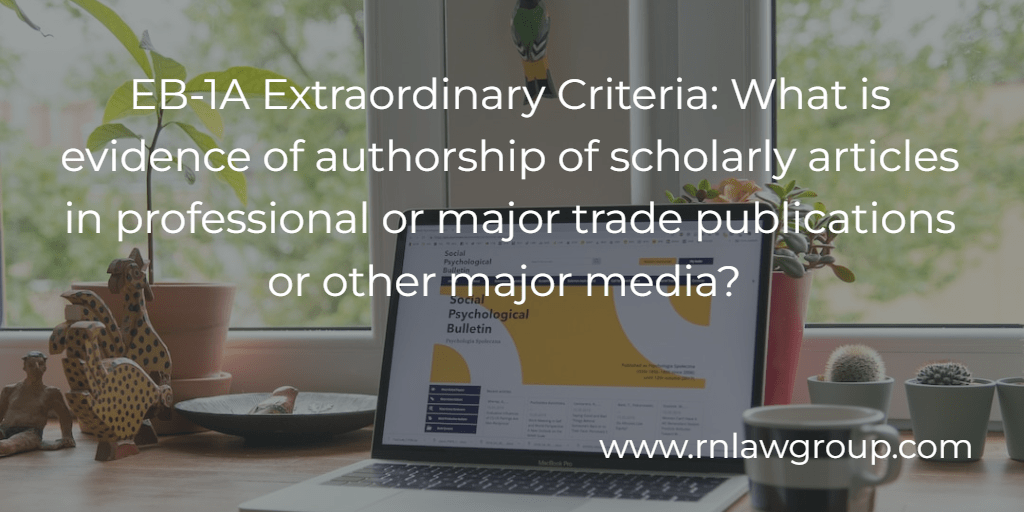
EB-1A Extraordinary Criteria: What is evidence of authorship of scholarly articles in professional or major trade publications or other major media?
The EB-1A employment-based immigration visa can appear to be a daunting process. An applicant must either show proof of a one-time achievement (major internationally-recognized award) meet 3 of the 10 listed criteria:
- Evidence of receipt of lesser nationally or internationally recognized prizes or awards for excellence
- Evidence of your membership in associations in the field which demand outstanding achievement of their members
- Evidence of published material about you in professional or major trade publications or other major media
- Evidence that you have been asked to judge the work of others, either individually or on a panel
- Evidence of your original scientific, scholarly, artistic, athletic, or business-related contributions of major significance to the field
- Evidence of your authorship of scholarly articles in professional or major trade publications or other major media
- Evidence that your work has been displayed at artistic exhibitions or showcases
- Evidence of your performance of a leading or critical role in distinguished organizations
- Evidence that you command a high salary or other significantly high remuneration in relation to others in the field
- Evidence of your commercial successes in the performing arts
These criteria can make even very well qualified candidates nervous about their eligibility, but with the right experience, the right lawyer, and a little luck, an applicant can have their Green Card in as little as three months. This series of articles will provide a background on each of the 10 criteria, examples of documents that can meet them, and common pitfalls to avoid.
The “authorship of scholarly article” criteria is often lumped together with the “publication about you, however there are different requirements for each of them, and there is a very low chance that one article would meet both criteria. In particular, USCIS wants the petitioner to show that they have written academic pieces for prestigious trade journals, professional journals, or other mainstream media, or that their work has been cited by other experts in the field.
To satisfy this criteria, the petitioner must show that at least one of their articles have been published in reputable professional or important trade periodicals or other significant media. The article needs to be in the petitioner’s area of specialty and show how they’ve made new contributions to the field. Additionally, articles published in general circulation newspapers can qualify for this criteria.
In addition to a copy of the publication, which identifies the petitioner as the author, it is recommended that you submit additional information on the publication itself, such as background information on the publication, its publishing criteria, and circulation numbers. Most of this information is readily available on the website of the journal or newspaper, but on rare occasions, it can be requested from them.
It is significant to note that fulfilling this condition does not just entail becoming an article’s co-author. The petitioner must be able to show the significance and influence of their contributions to the area, as well as that they had a significant hand in the research, writing, and publication of the papers.
Many people pursuing this criteria start off with no experience being published. That should not discourage anyone because there are numerous ways to become published. You can volunteer for research projects through your employment. You can reach out to magazines and newspapers to see if they are interested in your content. Many people hire Public Relations professionals to assist them in the process and open the doors to journals and newspapers. A PR professional will have years of experience and be able to direct you to publications that best match your expertise.
This criteria is one that USCIS has limited ability to question. As long as you provide evidence that you are the author, the article was properly published, and background information on the publication, there is little for USCIS to question. As an additional backstop, you can request an experience letter from someone who has read the article to discuss its impact on your field.
Nevertheless, there are some pitfalls to watch for, such as:
- Plagiarism is a major crime in academic work, and the author may face harsh repercussions. It is crucial to make sure that all sources are correctly credited and that any material that has been borrowed is identified as such.
- Failure to adhere to editorial standards: Authors are expected to adhere to certain editorial standards in professional and important trade magazines as well as other significant media. A poorly written essay may be rejected or published if certain standards are not met.
- Material that is inaccurate or misleading: It’s imperative to make sure that all of the information offered in an article is true and backed up by facts. The credibility of a writer and the publication can be damaged by inaccurate or deceptive information.
- Lack of novelty: Scholarly writings should advance their fields in some way, and a lack of originality might reduce the worth of a piece. To make sure that the piece offers readers something special and valuable, thorough research is crucial.
- Conflict of interest: Authors are required to make clear any conflicts of interest that might influence their research or the article’s conclusions. Failure to do so may result in charges of bias or improper behavior.
- Failure to engage the audience: Scholarly articles should be written in a way that engages the intended audience before being published in major professional, trade, or other media. Failure to do so may lead to low reading or a lack of interest in the article.
The best guide through this entire process is an experienced immigration attorney. An attorney who has experience in filing petitions that use this criterion will know what to look for in articles and can even recommend PR professionals who can guide an applicant through the process. An experienced immigration will have the knowledge to understand how to present an article effectively to avoid an RFE.
By: Karim Jivani
Karim Jivani is a Special Attention Staff Attorney at Reddy Neumann Brown PC who focuses on employment-based non-immigrant visas. Karim’s practice covers all phases of the visa process including filing petitions, responding to Requests for Evidence (RFE), and drafting motions and appeals. He has completed over 30 RFE’s to date in response to H-1B, L-1, I-140, and VAWA petitions.

